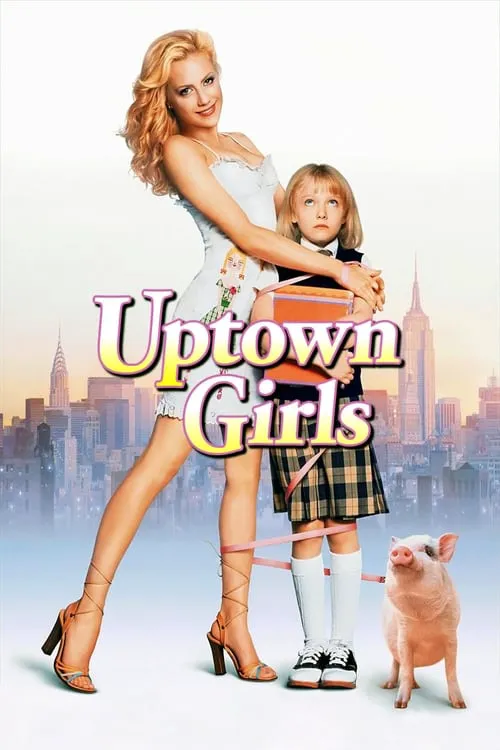Uptown Girls

Plot
Molly Gunn, played by Brittany Murphy, is a free-spirited young woman who lives by her own rules. As the daughter of a legendary rock musician, Roy (Heather Sullenberger), Molly grows up surrounded by the trappings of fame and fortune, but lacking in real-world guidance. With her manager, Tommy (Jsu Garcia), handling her finances, Molly thinks she can coast through life without worrying about the mundane responsibilities that plague most adults. However, when Tommy steals her money, Molly is left without a safety net. She's forced to swallow her pride and get a job to make ends meet. Her search for employment leads her to an unlikely position – nanny for six-year-old Ray Schleine, the daughter of a powerful music executive. Ray, played by Dakota Fanning, is a precocious and sensitive child who's been overshadowed by her demanding parents. Her father, Ray Ronnie Schleine (Donald Faison), is a strained and overbearing presence in her life, while her mother, Gertrude, is largely absent. As a result, Ray has difficulty expressing herself or forming attachments, preferring the company of her pets over humans. Molly's unconventional approach to childcare shakes things up in the Schleine household. She refuses to discipline Ray, opting instead to encourage her to express her creativity and individuality. Despite their differences, Molly and Ray quickly form a bond, with Molly serving as a surrogate mother figure and Ray as a catalyst for personal growth in Molly's life. As the unlikely pair navigates their new relationship, Molly begins to confront the realities of adulthood. She faces challenges such as paying bills and cooking meals, all while trying to balance her laid-back lifestyle with the responsibilities that come with being a caregiver. Meanwhile, Ray learns to express herself and develop a sense of freedom, all under Molly's watchful eye. Their adventures together take them on a series of misadventures, from messy playdates and school events to chaos-inducing outings in the park. Despite the mayhem they create, Molly and Ray learn valuable lessons from each other. Molly discovers that being an adult is not just about handling finances or keeping a tidy house, but also about nurturing and caring for those in need. Ray, on the other hand, learns that it's okay to be a kid and have fun, letting go of the expectations and pressures that come with being a "good" or "well-behaved" child. Throughout their journey, Molly and Ray develop a deep and meaningful connection. They encourage and support each other, helping to break down the emotional barriers that have held them back for so long. Molly comes to appreciate the value of having a family and a support system, while Ray gains a sense of self and confidence that will stay with her for the rest of her life. As the film nears its conclusion, Molly and Ray face one final challenge. Ray's parents announce their impending divorce, leaving the child reeling with uncertainty and confusion. Molly steps up to offer support and guidance, helping Ray through the difficult process of adjusting to her new family dynamic. In the end, Molly and Ray emerge transformed and renewed. They've learned valuable lessons about the importance of family, friendship, and growing up. For Molly, it's a journey toward maturity and responsibility, while for Ray, it's a journey toward self-discovery and confidence. As they navigate the ups and downs of adulthood together, they prove that even in the most unlikely of circumstances, true friendship and connection can be found.
Reviews
Micah
The movie that propelled Halle Berry to an Oscar, overall it follows a redemption and heartwarming path, touching upon racial issues, but the conflict isn't intense. Halle Berry's Black accent is interesting to listen to, and the sofa passion scene is indeed fiery.
Adam
The romance between the widow of a death row inmate and the prison guard feels somewhat forced. Billy Bob Thornton perpetually exudes an aura of wanting to eliminate the female lead, and his coldness towards his family lacks adequate explanation, making his romantic entanglement with the protagonist unconvincing. Watching Halle Berry weeping on the steps evokes a sense that she's trapped in a "Get Out"-esque vortex.
Kennedy
Mark Forster's breakthrough film, which earned Halle Berry Best Actress awards at both the Berlin International Film Festival and the Oscars. The first third of the film focuses on the death penalty execution and father-son conflicts, while the remaining two-thirds explore the love story between the wife of a death row inmate and the executioner. Their shared experiences of loss and pain bring together two people who should, by all rights, be enemies. Issues of racial discrimination and a severely strained father-son relationship run throughout the entire film. Halle Berry's Best Actress win is well-deserved. Her performances in the hospital scenes, the mix of tears and laughter at home, and the combination of shock and acceptance she displays at the end are all memorable. The film makes extensive use of mirrors, shallow focus shots, and distant, voyeuristic perspectives to emphasize a sense of separation and isolation.
Sarah
Halle Berry delivers an unforgettable performance, portraying a character simmering with restrained emotions, always on the verge of eruption.
Joseph
Given that Halle Berry won the Oscar for Best Actress that year, I had high expectations going into this movie, but I'm disappointed after watching it. Her performance is run-of-the-mill, without anything particularly impressive. I'm skeptical that she would have won the Oscar without some "politically correct" factors playing a role.
Recommendations




